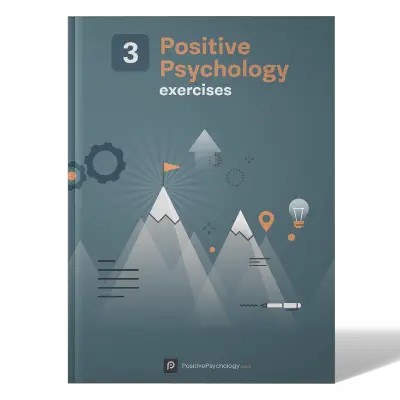15 Must-Watch TED Talks on Positive Psychology
 TED talks have been around for over 30 years now, and since they’ve been online, thousands of them have been uploaded for viewers like you and me.
TED talks have been around for over 30 years now, and since they’ve been online, thousands of them have been uploaded for viewers like you and me.
We’ve put together a list of our 15 favorite positive psychology TED talks to inspire you about key themes, from how we measure happiness to why our questions matter.
To discover what some of the most influential, well-known experts have to share on topics like grit, wellbeing, and gratitude, check out these best-of-the-best videos.
Then, let us know what you’d add to this list, which you loved the most, and tell us why in the comments below!
Before you continue, we thought you might like to download our three Positive Psychology Exercises for free. These science-based exercises will explore fundamental aspects of positive psychology including strengths, values, and self-compassion, and will give you the tools to enhance the wellbeing of your clients, students, or employees.
This Article Contains:
- Martin Seligman: The New Era of Positive Psychology
- Mihaly Csikszentmihalyi: Flow, the Secret to Happiness
- Dan Gilbert: The Surprising Science of Happiness
- Shawn Achor: The Happy Secret to Better Work
- Carol Dweck: The Power of Believing That You Can Improve
- Angela Duckworth: The Key to Success? Grit
- Lea Waters: Warning – Being Positive Is Not for the Faint-Hearted!
- Robyn Stratton-Berkessel: Playful Inquiry – Try This Anywhere
- Barry Schwartz: The Paradox of Choice
- Tali Sharot: The Optimism Bias
- Nic Marks: The Happy Planet Index
- Philip Zimbardo: The Psychology of Time
- Chip Conley: Measuring What Makes Life Worthwhile
- Daniel Goleman: Why Aren’t We More Compassionate?
- David Steindl-Rast: Want to Be Happy? Be Grateful
- A Take-Home Message
1. Martin Seligman: The New Era of Positive Psychology
Martin Seligman
It’s impossible to understand positive psychology without knowing about its founder Martin Seligman.
With 20 self-help books and over 250 research articles to his name, he is the creator of the PERMA framework that describes the five elements of the “good life” – genuine, long-term wellbeing and happiness.
Seligman tells us in this talk that the current “disease model” of psychology isn’t good enough.
He explains why we should move away from the damage-repair approach that’s been standard practice in psychology for almost a century. He gives a compelling introduction to the three cornerstones of positive psychology. It’s a must-watch for anyone seeking an introduction to the field.
2. Mihaly Csikszentmihalyi: Flow, the Secret to Happiness
Mihaly Csikszentmihalyi
The serenity, absorption, and complete engagement we feel when we’re entirely wrapped up in something we love has a name in positive psychology: flow.
Csikszentmihalyi coined the term “flow” in his 1975 book Beyond Boredom and Anxiety: Experiencing Flow in Work and Play, and in this talk, he explains the roots of happiness and how to find a meaningful life.
Csikszentmihalyi describes how he became interested in “a life worth living” during his childhood experience of the Second World War and how it triggered his life-long fascination with happiness.
He recalls some of his most memorable research experiences, interviewing blind nuns, Navajo shepherds, and Himalayan climbers, and explains the challenge that we’re currently trying to understand: “How can we put more and more of our everyday lives in that flow channel?”
3. Dan Gilbert: The Surprising Science of Happiness
Dan Gilbert
Have you worked hard on becoming happier only to see your happiness level become stagnant? Dan Gilbert, the author of Stumbling on Happiness, explains his scientific research about predicting happiness.
In this hilarious talk, Gilbert questions the all-too-common assumption that we’re searching for the thing that is happiness. He argues – and provides plenty of scientific evidence in support of this argument – that instead, we “synthesize” happiness. For humans, Gilbert explains, happiness is a creation. That there’s no distinction between what we’ve mistakenly come to see as “natural” and “synthetic” happiness and gives examples to illustrate.
Getting scientific, Gilbert describes the “psychological immune system,” which lets us feel truly happy even when things don’t go as planned.
The key takeaway? We all have the capacity to synthesize that (not so elusive) happiness, and self-awareness of our preferences and ambitions is a great place to start.
4. Shawn Achor: The Happy Secret to Better Work
Shawn Achor
If you want to hear about how unicorns, fake graphs, and weirdos related to happiness, this funny and very personal TED talk is for you. In it, author Shawn Achor tells us how to increase happiness levels in organizations and ourselves, starting with a story about his little sister falling off a bunk bed.
And having delivered lectures at the White House, NBA, and NFL, Achor is well acquainted with what happiness at work entails. But it’s not as simple as we might think, he argues.
We often believe that we have to be successful to be happier, but Achor gives plenty of reasons why we can ‘reverse the formula.’ in his words
In this video, he tells us about activities that help us do precisely that, summing it all up nicely in a thought-provoking sentence: “If happiness is on the opposite side of success, your brain never gets there.”
5. Carol Dweck: The Power of Believing That You Can Improve
Carol Dweck
What happens when we push ourselves outside of our comfort zones to learn something tricky or completely novel?
Carol Dweck has spent most of her professional life researching the growth mindset, the idea that we can grow our skills and capabilities with perseverance and hard work. Her book, Mindset: The New Psychology of Success, provides plenty of research-based examples of extraordinary accomplishments, and this TED talk gets to the very heart of it all.
In this talk, Dweck covers how we can move from a fixed mindset to a growth mindset, with a little help from scientific findings. She talks about her work with struggling students and University of Washington game scientists, and even provides some parenting questions that provide excellent food for thought. If you’ve been looking for an introduction to “the power of yet,” you’ll love this video.
6. Angela Duckworth: The Key to Success? Grit
Angela Duckworth
University of Pennsylvania professor Angela Duckworth was a seventh-grade math teacher when she put her finger on grit. This TED talk is an excellent introduction to the concept and how it’s been shown to relate to success.
Duckworth describes herself as an ambitious child, but one who was never really gifted. So how did she become a bestselling author, emeritus professor, and celebrated researcher? With passion and perseverance, she explains – with grit.
In this talk, she discusses what “doing well in school” really requires besides an ability to learn quickly and easily. She talks about how it relates to Dweck’s growth mindset and talent, and highlights what needs to be done to bring the field forward.
If you haven’t had a chance to watch this TED talk yet, it’s a great primer on one of the newest but best-known positive psychology concepts out there – in under six minutes.
7. Lea Waters: Warning – Being Positive Is Not for the Faint-Hearted!
Lea Waters
There is a reason why we are called “humankind,” argues Lea Waters, director of the Positive Psychology Centre at the University of Melbourne. This talk starts with a look at desensitization as Waters describes the moment she realized she wanted to be part of something bigger and better.
In this video, she makes a strong argument for why we need to hear more positive news and shares how delving into the good side of human nature helped her struggle with depression.
Waters invites us to consider some of these positive qualities with her. Citing ‘moral excellence,’ optimism, and inspiration as brilliant examples, she underscores why kids need to grow up realizing they’re part of something good. She invites us to be part of that.
One of the most thought-provoking comments in this TED talk concerns the ‘elevation effect,’ where we’re reminded that our commitment to worthwhile ideas can genuinely change the world.
8. Robyn Stratton-Berkessel: Playful Inquiry – Try This Anywhere
Robyn Stratton-Berkessel
What’s the best thing that’s happened to you today? The language we use to ask questions can have a significant impact on the answers we get.
Inquiring about what works in the world and the positive things that give us life are one way to create a whole new story, according to Robyn Stratton-Berkessel in this talk. In her career as a positivity strategist, her focus is on facilitating strength-based change to develop high-impact, positive change in organizations and people.
Playful inquiry is more than just one technique in her toolbox; it’s a perspective shift that can be life changing. Throughout the talk, Stratton-Berkessel shares many eye-opening experiences of its power in action – from executive retreats with Google to a cab ride with a driver who fought in World War II.
By the end, you’ll understand why asking the right questions could be just what we need to realize what gives our lives meaning. And you might be astonished to find out what she learned by asking this question herself!
9. Barry Schwartz: The Paradox of Choice
Barry Schwartz
Why are so many of us disappointed and depressed? Psychologist Barry Schwartz argues that living in a world with too many choices is a significant factor in our unhappiness. In fact, it’s the topic of his 2004 book of the same name.
In this video, Schwartz suggests that the secret to happiness is living with lower expectations.
But if it’s that easy, then why is it so difficult? Because, as he points out, choice is everywhere, in our supermarkets, our careers, and even in our identities. To get over the paralysis that is far too much choice, Barry’s solution is simple: be satisfied with less than perfect, more often.
Schwartz manages to tackle some severe issues surprisingly well in this brief and light-hearted talk, making it a great watch if you’re looking for a way to feel more satisfied with your life.
10. Tali Sharot: The Optimism Bias
Tali Sharot
You’ve heard of negativity bias, but what about an optimism bias? Tali Sharot is a firm believer in the latter, and here’s where you can learn about some of her research on this apparently global phenomenon.
Most of us are likely overestimating our chances of winning the lottery, as an example, while at the same time underestimating our likelihood of being in a car crash. For a positive psychology lecture, it sounds quite sobering.
However, it’s precisely this optimism that can make us happy, Sharot posits. Imagine the thrill of waiting for the weekend or a kiss from a loved one, and that’s the anticipation that enhances our wellbeing.
Optimism also enhances our physical health, lowers our stress, and more. Watching this video is an excellent way to learn why an optimism bias is good for us.
11. Nic Marks: The Happy Planet Index
Nic Marks
“For too long, we have peddled a nightmarish vision of what’s going to happen,” Marks opens in this speech.
Have you ever wondered why most science-fiction films tend to portray humanity under threat or take place in dystopian settings? Happiness researcher Nic Marks believes it’s because we are too focused as a species on the worst-case scenario.
Nic is the director of the New Economics Foundation’s Centre of Well-being. He’s contributed vast amounts to the Happy Planet Index – the world’s first sustainable wellbeing measure and authored The Happiness Manifesto about the blinkered pursuit of economic growth.
Marks explains talks in this TED talk about how we can overcome this myopia and focus on progress instead. One method, he suggests, is using the Happy Planet Index rather than gross domestic product as a measure of national success, before providing a great overview of the Index itself.
While this talk is highly informative, Nic Marks also underscores how it links back to the individual. Watching this lecture is one way to learn how generosity, compassion, altruism, and more can help us build a happier world.
12. Philip Zimbardo: The Psychology of Time
Philip Zimbardo
Have you heard of the notorious Zimbardo prison experiments? Here’s the Stanford professor behind the much-criticized studies, but with a talk on success rather than roles and identity. After the infamous experiment, Zimbardo’s focus became how psychology could be used to benefit humanity, and he’s won numerous rewards for his high-profile work.
In this TED talk, Zimbardo poses an interesting question: Are you oriented in the past, present, or future when making a decision? Illustrating with stories of pledged virginity and Mischel’s marshmallow experiment, he explains how many of the conundrums we face in life can be solved by answering this question.
He calls it “time perspective” and reveals how it influences our orientations and how to balance them optimally. In under seven minutes (Zimbardo’s point exactly), we’re invited to learn how we can recognize biased time perspectives in ourselves and overcome them to live more productive, energetic, and happier lives.
13. Chip Conley: Measuring What Makes Life Worthwhile
Chip Conley
Chip Conley is the entrepreneur behind the Joie de Vivre hotels, French for “zest for life.” The Bay Area Most Innovative CEO award winner also has several widely popular books about performance and work, including Wisdom @ Work and Peak.
The latter is the topic of this TED talk, in which he explains why we need a business model based on Abraham Maslow‘s hierarchy of needs, with company self-actualization as the ultimate goal.
After outlining the psychological theory, Conley asks whether we are addressing these top needs. Are we creating the right conditions in our companies? And what does that look like?
In this talk, Conley shows us how to begin valuing the intangible over the tangible, which helps us better strive for a life worth living.
14. Daniel Goleman: Why Aren’t We More Compassionate?
Daniel Goleman
Psychologist Daniel Goleman poses a great question in this TED talk on compassion: Why aren’t we more compassionate, more often?
The author of New York Times bestseller Emotional Intelligence opens by recapping a Princeton experiment on emotional intelligence and moves on to discuss the neuroscientific processes that may be to blame… or are they?
In this inspiring talk, Goleman triggers the viewer to think about empathy and society, as well as how we can show more humanity to others.
This brief but inspiring talk from one of positive psychology’s best-known names combines personal anecdotes and business-world observations to craft a compelling argument for more kindness and empathy.
15. David Steindl-Rast: Want to Be Happy? Be Grateful
David Steindl-Rast
Born in 1926 in Vienna, Brother David Steindl-Rast is a Benedictine monk and interfaith scholar. He’s had a fascinating life. At the age of 93, his writing and speaking career has included talks in five continents on topics like transformation, spirituality, and meaning.
Gratitude is one of Steindl-Rast’s key topics, as you’ll see in this now-famous TED talk on happiness and slowing down.
We all want happiness, Brother David begins. And happiness, he argues, comes from gratitude. In this concise lecture, he covers the difference between grateful experiences and grateful living, reminding us of so many things we often take for granted.
Given that Steindl-Rast has spent years living in seclusion, this couldn’t be further from a Sunday School sermon. It’s insightful and heart-warming, and his genuine approach will leave you feeling like you’re part of something much bigger.
A Take-Home Message
If you’re less of a reader and more of a watcher, these talks are an ideal way to learn more about what’s happening in the field of positive psychology today. Here, you’ll find some wisdom from a few of the most influential thinkers and researchers around Hopefully, there’s something that speaks directly to you.
Did any of the talks spark a thought for you? Did you learn any new concepts or stumble across any fresh perspectives? What other talks would you add to this list?
Please let us know in the comments section right below; we want to hear!
We hope you enjoyed reading this article. Don’t forget to download our three Positive Psychology Exercises for free.
Let us know your thoughts
Read other articles by their category
- Body & Brain (42)
- Coaching & Application (56)
- Compassion (26)
- Counseling (50)
- Emotional Intelligence (24)
- Gratitude (18)
- Grief & Bereavement (21)
- Happiness & SWB (39)
- Meaning & Values (25)
- Meditation (20)
- Mindfulness (44)
- Motivation & Goals (43)
- Optimism & Mindset (32)
- Positive CBT (25)
- Positive Communication (20)
- Positive Education (44)
- Positive Emotions (30)
- Positive Leadership (13)
- Positive Psychology (32)
- Positive Workplace (33)
- Productivity (16)
- Relationships (42)
- Resilience & Coping (34)
- Self Awareness (20)
- Self Esteem (36)
- Software & Apps (22)
- Strengths & Virtues (30)
- Stress & Burnout Prevention (33)
- Theory & Books (44)
- Therapy Exercises (35)
- Types of Therapy (58)




What our readers think
This somewhat helped me im already a happy person so i can’t really relate.
This helped me a lot. Being a student, I was feeling deprived and depressed but to my mental situations to deal with the COVID-19 situations. At this stage I was not able to think any thing except COVID 19. When I watched your videos, I started feeling better. It also built my mental strength